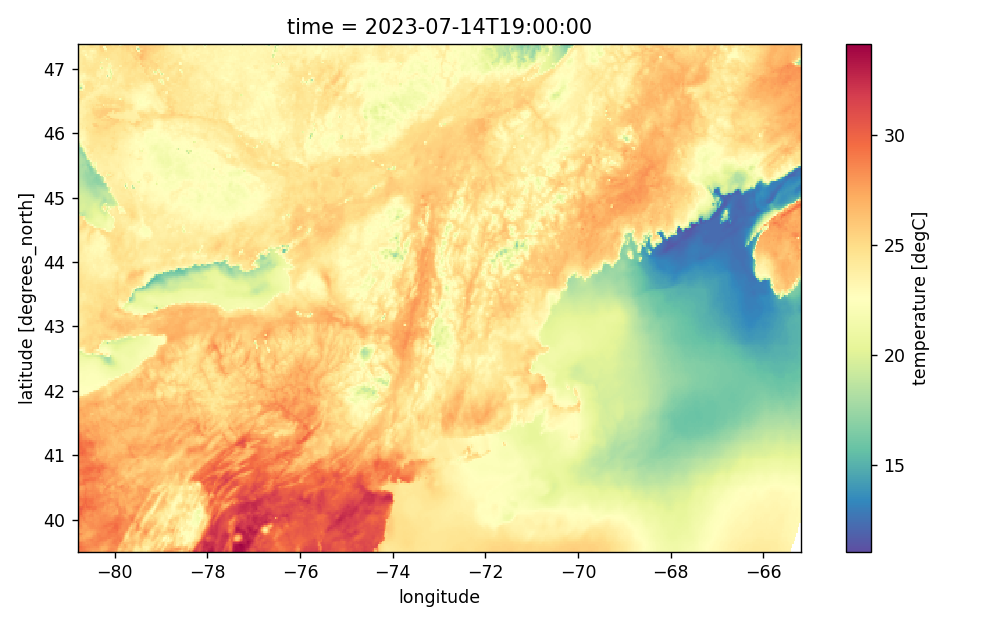Endpoints
The following endpoints are available.
/weather
This is the basic entry point into our datasets to request both historical and forecast weather data.
| Parameter | Description | Notes |
|---|---|---|
param |
Valid list of parameters | Default: temperature, dewpoint_temperature, mean_sea_level_pressure, wind_speed, 100m_wind_speed, relative_humidity, surface_solar_radiation, surface_thermal_radiation, total_cloud_cover, total_precipitation |
start |
start datetime string YYYY-MM-DD |
Default: 3 days into the past. Provided time is interpreted as UTC. |
end |
end datetime string YYYY-MM-DD |
Default: 7 days into the future. Provided time is interpreted as UTC. |
freq |
H (hourly), D (daily), or M (monthly) |
Default: H (hourly) |
resample_method |
max, mean, min, or sum | When the frequency is set to daily (D) or monthly (M), use this to specify the aggregation method. |
location |
location search string (address, city name or zipcode) | This value is used to look up the coordinate if latitude/longitude values are not provided. |
location_id |
reference for location | This is handy when making requests for multiple locations. |
lat |
latitude(s) | If location parameter is not provided. |
lon |
longitude(s) | If location parameter is not provided. |
north |
latitude north | For bounding box. |
south |
latitude south | For bounding box. |
east |
longitude east | For bounding box. |
west |
longitude west | For bounding box. |
model |
Valid model | One of era5, era5land, gfs, gefs, hrrr, cfs, hrrr-subhourly, nam-conus, icon, icon-eu, icon-d2, gdps, hrdps, ifs-open or nbm |
run |
model initialization time (e.g. 00z) |
Use this to retrieve previous initialization run of the model from the same day instead of the latest. |
format |
Download format (json, csv, or netcdf) |
Default: json |
Multiple coordinates
You can request multiple locations by providing a corresponding list of latitude and longitude in the API call as shown below. This can significantly cut down the request time if you need to query hundreds of locations.
Region (NetCDF)
Let's say we wanted to look at the regional weather forecast for all of New England. We can request the data by specifying the bounding box for New England as shown below:
This will return the data in NetCDF format, which we can see here:

/archivedforecast
Up to 3 years of GFS (00Z runs) are archived.
| Parameter | Description | Notes |
|---|---|---|
param |
Valid parameters | Default: temperature, dewpoint_temperature, wind_speed, mean_sea_level_pressure, surface_solar_radiation, surface_thermal_radiation, total_cloud_cover |
location |
city name or zipcode | This value is used to look up latitude/longitude. |
lat |
latitude(s) | If location parameter is not provided. Up to 100 locations allowed. |
lon |
longitude(s) | If location parameter is not provided. Up to 100 locations allowed. |
utc_cycle |
datetime of the run (00z) | This specifies the model run. E.g. 2023-07-01T12:00:00 |
model |
gfs |
This specifies the archived model. Default: gfs |
/airquality
Use this endpoint to get air quality forecast data.
| Parameter | Description | Notes |
|---|---|---|
param |
Valid parameters | Default: CO, NO, NO2, O3, PM10, PM25, SO2 |
location |
city name or zipcode | This value is used to look up latitude/longitude. |
lat |
latitude(s) | If location is not provided. Up to 100 locations allowed. |
lon |
longitude(s) | If location is not provided. Up to 100 locations allowed. |
/epw
This API will return an EnergyPlus Weather (EPW) file for the given location and year (if applicable). The EPW is generated from ERA5 data on the fly and is not limited to airport locations. Downloading EPW file can also be done via our Weather Downloader App, but if you require many hundreds of EPW files, downloading via API is easier to do.
| Parameter | Description | Notes |
|---|---|---|
location |
city name or zipcode | This value is used to look up latitude/longitude. |
lat |
latitude | If location parameter is not provided. We suggest using lat/lon if you need to specify a precise coordinate. |
lon |
longitude | See above. |
year |
year for AMY file | If not specified, a TMY file will be returned using the latest 15 years of data (180 months), unless start_date is specified (see below). |
start_date |
start date for the custom date range (YYYY-MM-DD) |
The custom date range is specified as 1 year starting from the start_date value. |
/datasets
Use this to get an update of the data. If you'd like to check that the data has been updated before making a call, use this API endpoint. This API call does not use any data units.
This call will return data in JSON format that lists the datasets the available date range for each dataset as shown below.
/account
Use this to get information on your current API usage.
This will return JSON data that looks like this: